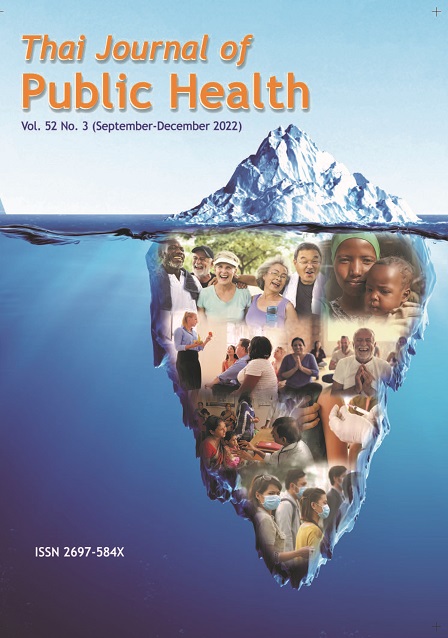Effects of a Self-Management Nursing Support Program with Health Care Volunteers for Insulin Dependent Type 2 Diabetes Mellitus Patients
Keywords:
Self – management, Food consumption behavior, Insulin dependent type 2 DM patient, Health care volunteer, Self-monitoring blood glucoseAbstract
Type 2 diabetes mellitus (DM) is a major public health problem worldwide. This quasi-experimental research aimed to examine the effects of a self-management program among patients with Type 2 DM on self-management efficacy, food consumption behavior, and HbA1C concentration, by applying the self-management concept of Kanfer and Gaelick-Buys and social support from healthcare volunteers. The sample group was Type 2 DM patients treated with insulin injections in the primary care unit, Thepparat Hospital, Nakhon Ratchasima province, Thailand. Systematic sampling of 25 people was used for obtaining the experimental group and the comparison group. The experimental group was encouraged to perform self-management by nurses and support from healthcare volunteers for 12 weeks. The program consisted of the self-management of blood sugar levels three times and was visited by healthcare volunteers every 3 days a week. Data were collected by interview questionnaire before and after the intervention at week 8 and week 12. HbA1C was also measured before and after the intervention at week 12. This research was approved by the Ethical Committee for Human Research of the Faculty of Public Health, Mahidol University, Thailand (MUPH 2021-080). The results showed that after the intervention in the 8th and 12th week, the experimental group was statistically significantly higher in self-efficacy (M8th 26.64 ± 2.25; M12th 38.68 ± 2.39) and consumption behavior scores (M8th 24.52 ± 2.22; M12th 35.00 ± 3.07) than before the intervention (M pre 22.52 ± 4.13; M pre 21.12 ± 2.19, respectively) and it was better than the comparison group (p < 0.05). After the intervention in the 12th week, the experimental group had a statistically significant decrease in HbA1C (M12th 9.28 ± 1.07) than before the intervention (M pre 10.19 ± 2.53) and lower than the comparison group (p < 0.05). This finding suggested that community nurse practitioners or nurses at Diabetes Clinics can apply this program to enhance insulin-dependent Type 2 DM patients to perform self-management and educate healthcare volunteers to support them while patients stay in the community.
References
World Health Organization. Global report on diabetes. Available from: https://www. https://www.who.int/data/gho/publications/world-health-statistics, accessed 18 August 2020.
Office of Policy and Strategy Office of the Permanent Secretary, Ministry of Public Health. Summary of important statistics. Available from: https://www.bps.moph.go.th, accessed 18 August 2020.
Division of Non-communicable Diseases, the Community Health Center, Debaratana Nakhon Ratchasima Hospital. Performance of chronic non-communicable diseases for the fiscal year 2020. editors. Annual Meeting Fiscal Year 2020; 30 Sep 2021; The community health center Debaratana Nakhon Ratchasima Hospital, Nakhon Ratchasima; 2021. p. 44-66.
Sittipran W. Effect of self-monitoring blood glucose program in poorly controlled type 2 diabetes mellitus patients on glycosylate level. J Prapokklao Hosp Clin Med Educ Cent 2015; 32(1): 68 - 82. (In Thai). DOI: 10.1080/20786190.2017.1340250
Kitcharoenchai R. The effectiveness of a nutrition self-management program on food consumption behaviors, HbA1c and body mass index in persons with type 2 diabetes. [M.N.S. Thesis in. Adult and Gerontological Nursing]. Chonburi: Faculty of Nursing Burapha University; 2013.
Zheng F, Liu S, Liu Y, Deng L. Effects of an outpatient diabetes self-management education on patients with type 2 diabetes in china: A randomized controlled trial. J Diabetes Res 2019:1073131. DOI: 10.1155/2019/1073131.
Duangklad K, Lapvongwatana P, Chansatitporn N. Improvement of self-management program in uncontrolled type II diabetes patients. JHNR 2020; 36(1): 67-83. (In Thai)
Parsons S, Luzio S, Bain S, Harvey J, McKenna J, Khan A, et al. Self-monitoring of blood glucose in non-insulin treated type 2 diabetes (The SMBG study): Study protocol for a randomized controlled trial. BMC Endocrine Disorder 2017; 17(1): 2-7. doi: 10.1186/s12902-017-0154-x.
Teachasub J, Boonchiang W, Narin R. Development of community participation caring model for people with diabetes mellitus. Nursing J 2020; 47(2): 111- 21. (In Thai)
Kamlungdee U, Bunmusik P, Watcharawiwat A. The development of home visit guidelines for patients with type 2 diabetes mellitus or hypertension run by family care team. SCNJ 2017; 4(1): 34- 45. (In Thai)
Kanfer FH, Gaelick-Buys L. Self-management methods. In: Kanfer F, Gaelick-Buys L, Goldstein A, eds. Helping people change: A textbook of methods. New York: Pergamon Press; 1991. p. 305-60.
House J. Work stress and social support. Available from: https://www.scirp.org, accessed 20 December 2020.
Cohen J. Statistical power analysis for the behavioral sciences. New Jersey: Hillsdale; 1988.
Chitayasothorn D. Sex roles: A psychological perspective. The Thai Chamber of Commerce Journal 2018; 28(1): 195 – 208. (In Thai)
Panyalert S, Imamee N, Kreingkaisakda W. Self-regulation to promote dietary and exercise behaviors of type 2 diabetic patients of Ban-Nongchado sub-district health promoting hospital, Suphanburi province. Thai Journal of Health Education 2017; 40(1): 69-81.
Pinkaew S. Effects of self -management program on diabetes control behaviors and fasting plasma glucose level in the new cases of insulin therapy, Bhumibol Adulyadej Hospital, Royal Thai Air Force. Royal Thai Air Force Medical Gazette 2018; 64(3): 49-60. (In Thai).
Christopher G. Annual symposium on self-monitoring of blood glucose (SMBG) Republic of Malta. Diabetes Technol Ther 2015; 17(1): 832-50.
Khunthong T. Effect of self-management support program on self-management behavior and blood glucose level in patients with type 2 diabetes undergoing insulin treatment. [M.N.S. Thesis in Nursing Science]. Songkhla: Prince of Songkla University; 2012.
Downloads
Published
Issue
Section
License

This work is licensed under a Creative Commons Attribution-NonCommercial-NoDerivatives 4.0 International License.
Creative Commons License CC-BY-ND


